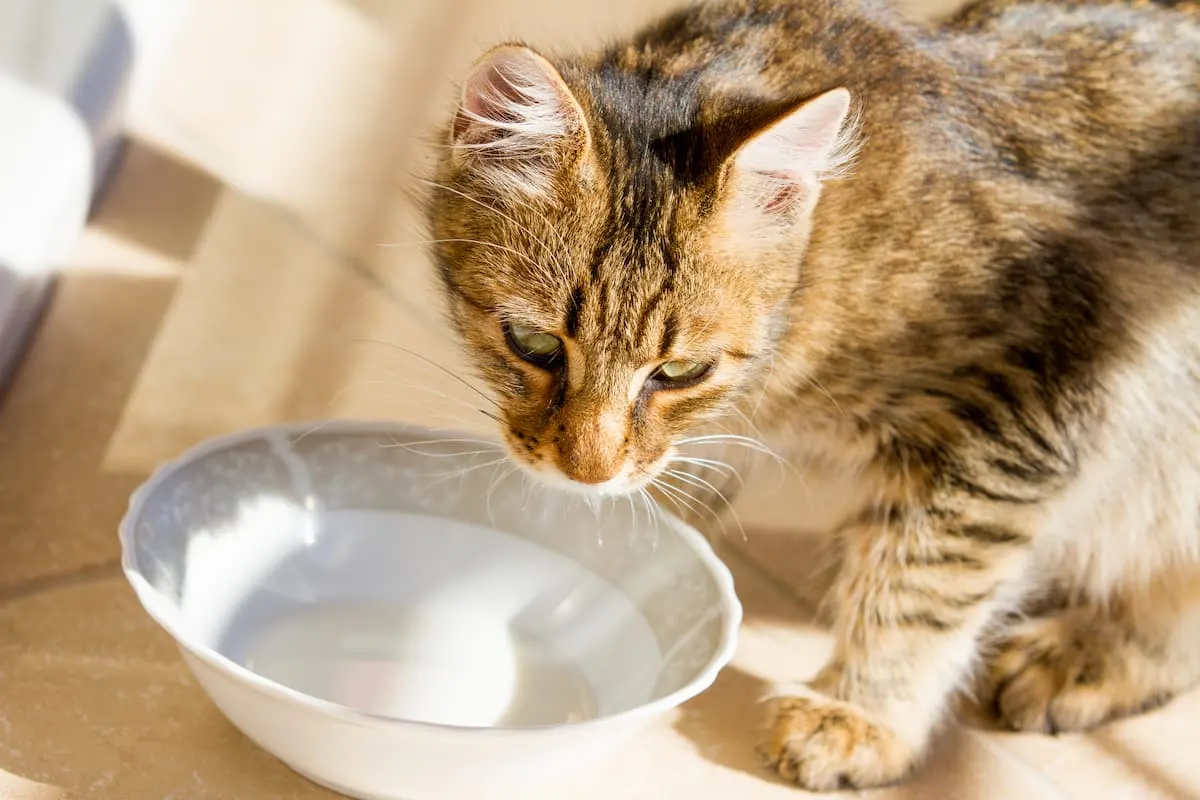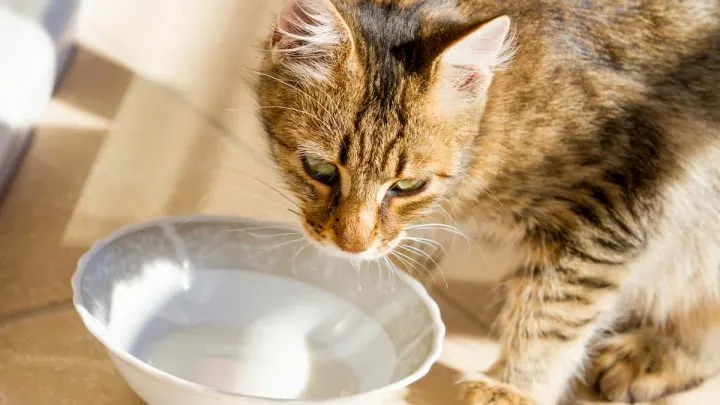Sometimes it can feel like there aren’t many options for keeping your cat happy and healthy. That’s one reason many cat owners are curious about feeding their pets plant-based milk like oat milk. Since oat milk has no lactose, can cats drink oat milk?
Cats can safely drink oat milk. Cats are obligate carnivores and struggle to digest plant matter and foods made from plants. Oat milk may be slightly hydrating for cats, and fortified milk may offer a small nutrition benefit, but your cat won’t get most nutrients or calories from the treat.
Most pet owners want their animals to have the best diet they can. After all, the media often shows cats loving a drink of milk, but responsible pet owners also know that most cats are lactose intolerant as adults. Here’s what you need to know if you’re considering adding oat milk to your cat’s diet.

Is It Safe To Give Cats Oat Milk
Oat milk is safe for the vast majority of cats, as long as it’s not sweetened or flavored. While vanilla, the most common flavoring for oat milk, is safe for cats, vanilla-flavored milk tends to have a lot of o unnecessary sugar. Too much sugar can be harmful to your cat, loading on a lot of nutrient-poor calories and raising your cat’s blood sugar far higher than it should be.
Even with plain oat milk, there is a small risk that your cat may have an allergic reaction or other negative response to the milk.
While oat milk doesn’t have lactose or any other problematic components of cow’s milk, some cats have a similar reaction to oat milk. For instance, diarrhea is a pretty common reaction to both cow’s milk and oat milk.
That being said, oat milk is a better and safer option for your cat than cow’s milk. Oat milk is less calorie-dense and contains fewer potentially irritating compounds compared with cow’s milk. It’s also a better option than goat’s milk or any other dairy milk since oat milk disrupts your cat’s diet less.
What’s In Oat Milk
Oat milk is a specific product, but here are the most common ingredients and whether those ingredients are cat safe or even beneficial or harmful for your cat.
| Ingredient | Optional or Required | Safe | Helpful | Harmful |
| Cut Oats | Required | X | X (in some cases) | |
| Water | Required | X | X | |
| Vanilla | Optional | X | ||
| Sugar | Optional | X (safe in small quantities) | ||
| Chocolate | Optional | X |
Plain oat milk can even be made at home if you want to. But avoid commercial oat milk that has been sweetened or flavored since both can be harmful to your cat.
It’s also essential to avoid oat milk that has unnecessary preservatives, flavoring ingredients, or salts. Those ingredients aren’t common in oat milk, but even small amounts can be problematic for your cat.
What Kind Of Milk Is Safe For Cats
Depending on their reaction and dietary needs, milk can be safe for some cats, but most veterinarians don’t recommend feeding milk. That includes plant-based milk like oat milk, nut milk, and others.
However, many cat owners still want to feed milk to their cats, either as an easy way to help boost hydration and calorie intake or because their cats seem to like and enjoy drinking milk.
Of course, drinking milk can have adverse effects on many cats. That means it’s vital for cats and cat owners only to use safer milk and less likely to cause problems.
In small amounts, cats can have cow’s milk or goat’s milk. Both kinds of milk come with a risk of gastric distress or other adverse reactions, so it’s best to give no more than a tablespoon at a time and to monitor your cat’s wellbeing carefully after they’ve had the milk.
Oat milk is a safer and generally healthier alternative, but not all cats enjoy oat milk.
Nut milk of any kind usually isn’t recommended. That’s because nut milk can have a lot of fat and sugar and can be difficult for your cat to digest. They also contain a higher amount of fat than oat milk and other grain milk.
Many people think that drinking raw milk is better for cats than pasteurized milk. However, while more nutrients are intact in raw milk than pasteurized milk, there is also a higher risk of pathogens, especially bacteria.
If you’re looking to include milk as a regular part of your cat’s diet, it’s best to get cat milk. Cat milk products usually aren’t cat milk from lactating cats, but they are cow’s or goat’s milk products that have been processed to lower the fat content and remove lactose. Some cat milk products also have their nutrients rebalanced to be closer to the nutrients your cat needs.
That makes cat milk products a reasonable choice, though adverse effects like diarrhea and weight gain are still possible.
What’s Better For Cats Milk Or Water
In general, water is a lot better for your cats than milk. That’s because hydration is essential for cats, and cats that primarily eat kibble are prone to being dehydrated. Milk can also be hydrating, but it usually doesn’t contain a well-balanced mix of nutrients.
That means that milk offers calories, but too many calories and too much fat for the other nutrients in the milk.
If you’re looking for a way to offer water as a treat instead of milk, consider giving them ice. Many cats like the cool sensation and will be more than happy with an ice treat instead of milk.
What Can You Give Cats Instead Of Milk
There aren’t too many alternatives to milk for cats since milk serves an unnecessary role in their diets.
If you’re looking for safe treat alternatives, you could go for a hydrating treat designed for cats like Churu. Unseasoned bone-broth (made without vegetables, salt, or other spices) can also be a great treat for your cats, especially as they get older.
Avoid dairy products like cheese, sour cream, or butter. All those products have the same problems as the milk they’re made from.
However, if you’re looking for the caloric benefits of milk and want to go for an option that’s easier on your cat’s stomach, cream may be a good choice. That’s because the cream is lower in lactose, but it is higher in fats. That means cream is more calorically dense (good for underweight cats).
Even with less lactose, though, cream still isn’t great for most cats.
For young cats, elderly cats, and cats that are sick, kitten formula can be another good option. Kitten formula shouldn’t be fed full time to older cats since it’s more nutrient-dense than adult cats need. But as an occasional treat or nutrition support for sick or underweight cats, kitten formula is an excellent choice.
Low-sodium tuna juice is a reasonable option as well. Full sodium tuna juice can have a little too much salt for most cats, but it’s an option that’s relatively low calorie while still offering some of the nutrients and proteins your cat needs in their diet.
Things To Consider
Hydration is essential for cats and is one of the main reasons many cat owners want to give their cats milk. Instead of milk, consider switching your cat to a wet food diet or giving them more wet-food treats to supplement their hydration.
Why is wet food such a good option for cats? Because wild cats get most of their hydration from their food in the wild, they don’t have a very strong thirst drive. That means that almost no cats will drink enough water to stay hydrated on their own if they primarily eat kibble.
If you choose to give your cat milk, it’s essential to keep an eye on them for signs of bad reactions. Diarrhea is probably the best-known adverse reaction to milk, but farting, lack of appetite, or seeming fatigued can all indicate that the milk has upset your cat’s stomach.
It’s also important to know that not all cats will react to milk the same way you give them milk. As your cat gets older, they will likely develop different reactions to milk, even if they tolerate it pretty well when they’re younger.
If you’re looking for other drinks to offer your cat, either as milk replacements or as hydration support, there are a few things you should avoid. Sugary or artificially sweetened drinks are a no-go for your cat. Caffeine can also be a severe problem, so you shouldn’t give your cats any caffeinated drinks.
Salt is another drink additive you should avoid. Salt can stress your cat’s kidneys and cause damage, especially if consumed regularly.
Lastly, alcohol of any kind should also be avoided. Not only is alcohol toxic for cats, but even the fumes can also make your cat angry and irritable. An angry cat is more likely to be aggressive with you and your other pets, so keep your feline friends far away from your drinks!

My name is James, and welcome to FAQCats!
Along with our team of cat owners, expert pet enthusiasts, and pet professionals, we aim to write engaging helpful, engaging content about cats. At FAQCats we strive to provide content that’s accurate and fun to read. Our team writes about everything related to cats; even the most complex of topics. Through extensive research and caring for our own fur-pals, we’re able to provide something cat owners worldwide will love. Have a look around, and leave us feedback anytime!

